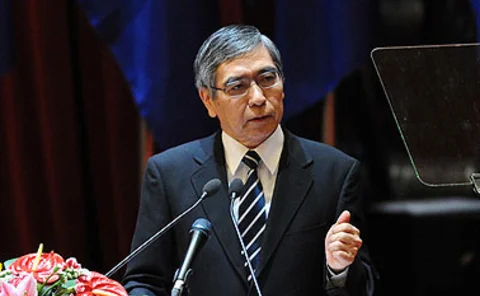Quantitative easing
Eurozone not at zero lower bound, Praet says
ECB chief economist Peter Praet has said the eurozone is not at its zero lower bound; remarks may not contradict earlier guidance by ECB president Draghi
Fed QE drives portfolio rebalancing towards foreign assets, Brazil paper finds
Research analyses ‘comprehensive’ dataset for Brazilian capital flows and a smaller one for other EM economies
ECB launches ‘comprehensive package’ as inflation outlook worsens
Mario Draghi announces cuts in interest rates and an expansion to the ECB’s asset-purchase programme, as well as a second TLTRO package, larger than the original
RBI paper questions impact of global spillovers
Authors find money and credit markets in India are largely unaffected by spillovers, although there is an impact via debt markets and the indirect effects of global growth and inflation
BoJ moves to ‘ease stress’ in JGB market
More generous limits applied to securities lending facility designed to alleviate strains in the market for government bonds, though liquidity indicators do not show clear signs of tightening
Draghi says ‘risk of side effects’ will not stand in ECB’s way
Mario Draghi says the European Central Bank will not be deterred by the ‘unintended consequences’ of its asset-purchase programme, ahead of a key March governing council decision
Kuroda insists there is ‘no limit’ to monetary easing
BoJ governor calls combination of QQE and negative interest rates the ‘most powerful' framework in 'history of modern central banking’ and argues there is space for more easing if need be
Policy interactions may drive global banking contraction, BoE economists find
The combination of unconventional monetary policy and regulation may cause ‘substantial’ spillovers as banks cut cross-border lending, economists including Kristin Forbes find
Kuroda and Davos panel see little alternative to divergence
Bank of Japan governor warns a synchronised exit from easy policy in the major economies ‘could be worse’ than the ’staggered arrangement’ at present
Consultancy and advisory services provider of the year: BlackRock Solutions
A key partner to major central banks engaging in complex asset purchases, asset quality reviews, resolution mechanisms and strategic asset allocations
BoJ board reveals miscommunication fears
New ‘summary of opinions’ reveals some on board concerned about giving impression stimulus is at its limit, while some see dangers to taking further action
Bank of Japan tweaks QQE with maturity extension and new ETF purchases
BoJ will continue to buy 80 trillion yen worth of JGBs a year, but with slightly longer to run to maturity; announces new ETF programme to offset sales of old stocks
Bank of Canada adds negative rates to toolkit
Central bank publishes new framework for monetary policy when interest rates are approaching zero, suggesting the overnight rate could be cut as low as -0.5%
Forecasters expected ‘significant’ drop in bond yields in wake of Fed easing, paper finds
Staff report published by the Federal Reserve Bank of New York examines how professional forecasters revised their predictions in aftermath of Fed decisions
Draghi reasserts ECB’s willingness to act
Mario Draghi says there cannot be any limit to how far the ECB is willing to deploy its instruments within its mandate, after easing package meets with lukewarm reaction on markets
BoJ’s Kiuchi wants to reduce flow of QQE
Board member says reduced flow of asset purchases would help relieve ‘excessive pressure’ on the Japanese government bond market and make monetary policy more ‘sustainable and stable’
ECB extends asset purchases to March 2017 or beyond and cuts deposit rate
European Central Bank will continue buying assets until at least March 2017 as part of latest easing package; Draghi describes deposit rate as ‘driver’ of policy as council cuts it to -0.3%
Researchers find ‘strong evidence’ of ECB policy spillovers to CEE countries
Working paper examines the spillover effects of the ECB’s ‘non-standard’ measures since 2007 on the Czech Republic, Hungary, Poland and Romania
Central bankers must research QE’s effects on inequality, Italian deputy governor says
Central banks must improve their understanding of how expansionary monetary policy affects inequality in developed economies, says Fabio Panetta
‘We will do what we must’ to hit target, says Draghi
ECB governor hints at further easing at next month’s monetary policy meeting
Christopher Pissarides on QE, the eurozone and economics
The Nobel economist tells Chris Jeffery why events in Europe have undermined neoclassical beliefs, QE is an optimal policy tool and Cyprus should not have joined the euro
Asset purchases having ‘sizeable’ impact on prices in eurozone, ECB paper finds
Working paper says ostensibly puzzling result can be explained by low levels of ‘market distress’ weakening some transmission channels but bolstering others
Economists challenge foundations of monetary economics
‘Neo-Fisherian’ approaches use standard New-Keynesian models to show that cutting interest rates will produce lower, not higher, inflation – and the result is surprisingly difficult to overturn
Bernanke offers insight into Fed’s political balancing act
Former Fed chair tells of navigating both political and economic pitfalls in crisis response, and says the US central bank’s independence is still under threat






















